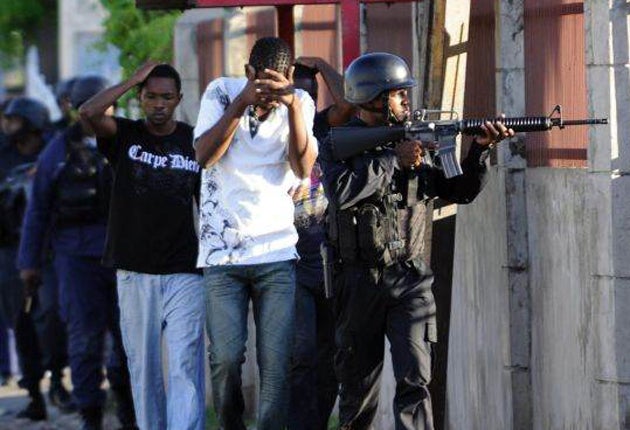Almost twenty years ago, Michael Christopher "Dudus" Coke heard that his father, Lester, had died in a mysterious jail fire while awaiting extradition to the US on drug charges. Today, as he wakes up in a prison cell somewhere in Jamaica, the Caribbean's most wanted man is aware of just how keenly some of the local business and political élite would now like history to somehow repeat itself.
Coke was captured on Tuesday evening, when the car in which he and Al Miller, an evangelical minister, were travelling to the US embassy was stopped at a police roadblock on the outskirts of Kingston. He had been on his way to surrender to US officials, who are seeking his extradition.
The arrest followed more than a month of violent clashes which have left at least 73 people dead and turned the Tivoli Gardens neighbourhood of Kingston into a virtual war zone.
Though Coke's detention may temporarily bring peace to their streets, it now also represents a serious headache for the Jamaican government, which is believed to be lukewarm about the prospect of having their country's most notorious underworld figure flown to New York. US prosecutors intend to charge him with running a vast criminal and cocaine-smuggling empire.
Coke, 42, controls many of the lucrative narcotics routes from South America to the east coast of the USA. He has also built a successful business empire, and managed to cultivate political connections in the Caribbean. As a result, as they say in the world of organised crime, he knows where an awful lot of bodies are buried.
Even the country's Prime Minister, Bruce Golding, owes him a debt of gratitude. Golding represents Tivoli Gardens, a ramshackle slum district of western Kingston where Coke was born, and where his notorious "Shower Posse" – which owes its name to its habit of showering rivals with bullets – is now based.
During the most recent election, Golding's ruling Jamaica Labour Party were publicly supported by the posse, who are quietly paid protection money by most of the area's businesses. They used their influence to ensure locals turned out in force to cast their vote.
It was hardly surprising, then, that in recent months Golding and many members of his government have not exactly rushed to make sure that Coke ends up in US. When American officials first filed their extradition request, in August, Golding blocked it, saying the case against Coke was gained by illegal wire-tapping and other flawed evidence. But after months of delay, and facing growing international pressure, he eventually signed an arrest warrant in May.
That led to widespread civil unrest in which two policemen and a soldier were killed, along with scores of locals. Coke is now scheduled to make his first court appearance today, and government lawyers seeking to buy time for their political masters may seek to have him tried for murder in relation to those recent deaths before the US extradition request is dealt with.
Either way, Coke's current circumstances are something of a mystery. Following his arrest on Tuesday he was initially taken to a local police station. But when crowds started to gather outside, he was evacuated by helicopter to an as-yet undisclosed location.
Jamaica's Police Commissioner, Owen Ellington told the BBC that Coke had been arrested by policemen "acting on intelligence" at a vehicle checkpoint. "Coke is being held now in a secure facility, and the security forces are taking every step possible to ensure his safety and well-being while he is in our custody," he said.
"I would like to appeal to the families, friends and sympathisers of Christopher Coke to remain calm and to allow the law to take its course. We would also like to reassure the country that we will continue our efforts to defeat organised crime and to restore law and order in this country while, at the same time, turning around the crime and security situation."
Coke faces life in prison if he is convicted of the charges that have been filed against him in New York, where prosecutors contend that since the mid-1990s he has run a network that uses women on flights from Jamaica to smuggle crack cocaine onto the streets of cities such as New York. He is also accused of gun-running.
In his defence, his legal team is likely to argue that he is a legitimate businessman and philanthropist, who provides services to many of his country's slum dwellers and helps impose law and order in a way that the police, who are largely distrusted in poor neighbourhoods, are unable to achieve.
Subscribe to Independent Premium to bookmark this article
Want to bookmark your favourite articles and stories to read or reference later? Start your Independent Premium subscription today.


Join our commenting forum
Join thought-provoking conversations, follow other Independent readers and see their replies